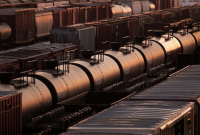Support strong Canadian climate journalism for 2025
Alberta's United Conservative government is again easing oil production limits for producers, setting a maximum production quota of 3.81 million barrels per day for December, up 250,000 bpd from the original limit set by the previous NDP government for last January.
The province says it will allow large producers to open the taps by another 10,000 bpd in each of November and December.
Outside the Global Business Forum in Banff,alta., Premier Jason Kenney defended continuing the program despite harsh criticism from Calgary-based Imperial Oil Ltd.
He says Alberta actually produced and shipped more oil last month than in November last year, before curtailment started.
In August, Imperial CEO Rich Kruger said the company would severely cut its crude-by-rail shipments because the curtailment program had made them less profitable by reducing the difference between Alberta and U.S. Gulf Coast prices.
He said the curtailments were "no way to run a railroad."
Earlier this week, the Canada Energy Regulator (formerly the National Energy Board) reported that crude-by-rail exports averaged 313,000 bpd in July, up nine per cent over June but well behind 354,000 bpd in December.
Kenney said the government continues to talk with companies about them taking over crude-by-rail contracts signed by the former NDP government. He said the province is considering rewarding companies that add rail capacity by letting them produce more oil.
"This is headed in the right direction," he said.
"Industry experts tell me the logistical maximum for crude-by-rail out of Alberta is in the range of 550,000 barrels per day so we can take out probably at least another couple of hundred thousand on rail."
This report by The Canadian Press was first published Sept. 26, 2019.





Comments